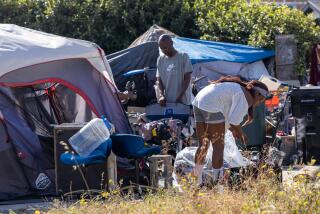Free Food, Rides and Shelter Lure Homeless In to Be Counted
- Share via
The homeless are accustomed to being shuffled along, waved off and passed over. On Tuesday, though, it was different. From Redondo Beach to Watts to Van Nuys, elected officials, poverty advocates and good-government groups were courting the region’s dispossessed with coffee and doughnuts, with dinner and pie--even with rides in city-owned vans.
For once, the homeless were in demand--the first to be tallied in the nation’s mammoth census count.
Mayor Tom Bradley, who in years past has ordered police to rid Skid Row business areas of the homeless and their cardboard homes, learned that a huge area of South-Central Los Angeles was left out of the planned count and instantly ordered city vans to pick up the homeless and take them to a local church to be counted.
Scores of high school students from the Los Angeles Student Coalition swarmed South Bay shelters Tuesday, registering the homeless to vote so that their numbers would count even more.
Downtown, the Homeless Outreach Program offered free dinner to about 1,000 homeless people, who wrapped around two city blocks waiting for their meal and free insulated blankets. The aim was to draw in--and then, of course, to count--the homeless.
Thus unfolded a massive campaign to boost the Los Angeles area’s share of federal and state anti-poverty funding, neighborhood improvement block grants and other sought-after funds by making certain that the head count finds as many heads as possible.
Los Angeles’ slice of the pie could swell by tens of millions of dollars over the next few years if the homeless count is high.
While most officials conceded that a significant undercount would occur, at least the odds had improved as thousands of the homeless were urged by one agency or another to participate.
“When you’re homeless, there’s a feeling of helplessness,” said Betty Hildreth, a homeless mother staying with her 10-year-old child at a shelter on Gramercy Street.
Moments earlier, the League of Women Voters had asked her to register to vote, and Hildreth had proudly signed her name.
“Today I’m registering to vote, and tonight I’m going to be counted by the U.S. census,” Hildreth said. “I want to help the politicians, so they can allocate money to the poor.”
The desperation of cities, economically squeezed in the 1980s by growing numbers of homeless families, mentally ill and drug-addicted street people, and chronically unemployed homeless men, was baldly apparent.
Wendy Greuel, assistant to Mayor Bradley, said the city of Los Angeles “has spent more money, and I think we’ve done more than any other area of the country, to find and count the homeless. This will benefit the entire city, and it simply has to be done.”
Last Friday, Santa Monica officials learned that their plan to count the homeless by busing them to armories--which happen to be outside city limits--would instead boost the homeless counts in those adjoining cities. Stunned, city officials scrambled to come up with another plan.
“We’re very hesitant to chase numbers, but we have immense pressure here to provide additional help, and it’s just beyond our means,” said Barbara Stinchfield, community development director for Santa Monica.
To hang on to its homeless, Santa Monica officials hesitantly decided to open a special family shelter to all comers for the night Tuesday.
“Because we are going to have an undercount, we cannot afford to make it any worse,” Stinchfield said.
With those words paramount in their minds, Los Angeles city employees fanned through South-Central, passing out flyers urging people to be counted.
“We are reaching out to people on the streets,” said Bob Vilmur, the city’s homeless coordinator. “The flyers offer shelter at a nearby church and food, and it’s in Spanish and English so everyone will know.”
For all the attention given to the people who lived without benefit of a roof on this balmy first day of spring, the professionals who work with the homeless year-round sounded a note of caution.
“In the year 2000, will the census still be counting people who have nowhere to live?” asked Toni Reinis of the California Homeless Coalition. “Is that OK for America, and what does that say about all of us?”
More to Read
Sign up for Essential California
The most important California stories and recommendations in your inbox every morning.
You may occasionally receive promotional content from the Los Angeles Times.










